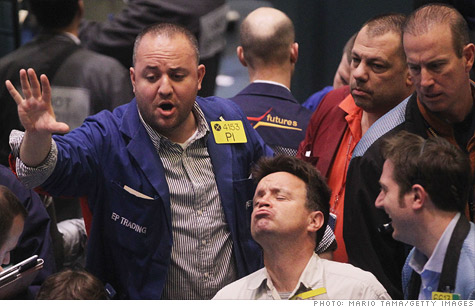Search News

Finance professor Craig Pirrong responds to an earlier column blaming speculators for high oil and gas prices. Pirrong says restricting speculators would be bad for producers and consumers.
In the blame game over rising oil and gasoline prices speculators often take center stage.
Earlier this week CNNMoney ran an opinion piece from the head of Better Markets, an organization dedicated to Wall Street reform, arguing speculators are behind the recent spike in oil and gas prices.
 |
| Craig Pirrong |
Here finance professor Craig Pirrong responds. Pirrong is director of the Global Energy Management Institute at the Bauer College of Business at the University of Houston. He has researched and published extensively on the role speculators play in commodity markets.
Better Markets' ("BM") indictment against commodity index trading suffers from only two problems: bad logic and a complete lack of evidence. Plus, the remedy they propose will bad for producers and consumers of energy.
BM claims that the purchases of commodity index funds drive up the prices consumers pay for commodities, and that the only question is by how much.
But the group provides no credible explanation of how index funds actually drive up prices, and rigorous empirical analysis finds no such effect.
A simple example seriously undermines BM's claims about the importance of index trading in driving energy prices: Natural gas.
During the period that BM claims that index trading has driven oil prices too high, natural gas prices have plunged to near-historic lows.
Index investors trade natural gas too -- a fact that BM interestingly doesn't mention: go figure.
The real story is that index traders trade these two markets identically, but the fundamentals for these commodities have been quite different, and fundamentals -- not index trading -- have driven prices.
At first blush, BM's claim seems plausible: why wouldn't the purchase of hundreds of billions of dollars of commodities by financial investors drive up prices above where they should be?
The answer is simple: index funds do not actually buy one bushel of wheat or one barrel of oil. They enter into contracts tied to the price of a basket of commodities over the life of the contract.
For instance, a fund that buys a swap makes or receives a payment equal to the difference between the value of the commodity index at the expiration of the swap contract and the price it agrees to when it enters into the swap. If it agrees to a price today of 700, and the value of the index is 750 at expiration, the fund receives a payment of 50. If the value of the index at expiration is 675 instead, it pays 25. In essence, the fund is speculating on what the value of the index will be in the future.
Some of the contracts (like the swap I just described) do not even permit the buyers to take ownership of the actual commodities, and index traders (or banks that hedge contracts) who buy futures contracts that do permit delivery sell their contracts without ever taking ownership. Ever. The dollars that flow into index funds are actually invested in Treasury bills and other financial instruments.
Index traders are therefore not competing with Wheaties consumers for bushels of wheat or with drivers for gallons of gasoline. This is crucial because to cause prices to be too high, index funds would have to somehow reduce the quantity of commodities available to consumers -- which they don't.
There are more complicated stories as to how speculation can distort quantities, but they all have a crucial implication that is not supported by the data: If speculators cause prices to be excessively high, inventories should build up, and speculators should be the ones holding the inventories.
There are historical examples of this.
The Hunts in silver in 1980. The International Tin Council that tried to prop up the price of that metal in the 1970s and 1980s. The United States government, which supported the price of milk in the 1980s and the price of grain in the 1950s and 1960s.
In each case, the party causing the high prices ended up owning huge quantities of the commodity they were trading. Each lost huge sums because they could find no one to buy these quantities at the high prices they had paid.
There is no evidence of such anomalous inventory accumulations in the hands of index funds or speculators generally during the commodity price booms of the 2006-2008 period, or the one currently in progress.
The absence of distortions in quantities is decisive evidence against the BM view that index funds -- or any speculator -- has driven up the price of commodities.
This is not the only evidence that tellingly contradicts the BM charges.
Careful research by University of Illinois scholar Scott Irwin and Southern Illinois University professor Dwight Sanders finds no evidence that index trading moves prices in the short run. Research I am conducting using a different methodology also fails to find any link between index trading and price movements over longer time periods.
BM draws a false distinction between commodity markets and capital markets.
Both are markets for risk that facilitate the transfer of risk from those who want to get rid of it (hedgers) to those willing to bear it at lowest cost.
Many capital market participants -- like pension funds -- are often the lowest cost bearers of commodity price risk because commodity index trading allows them to diversify risk more effectively.
Commodity index trading therefore reduces the cost the bulk of hedgers incur to manage their price risks. Integration of commodity and capital markets improves risk allocation, and index trading assists in that integration.
BM's call to ban index trading would therefore relegate commodity markets to a financial ghetto.
This would hurt not just pension funds and others that benefit from commodity index investment, but the producers and consumers on whose behalf BM claims to be acting. This is bad policy, based on bad economics.
Adam Smith wrote that agitation against commodity trading resembled "popular terrors and suspicions of witchcraft." Things have changed little in 236 years: Adam Smith's sharp appraisal accurately describes Better Market's hostility to index trading.
| Index | Last | Change | % Change |
|---|---|---|---|
| Dow | 32,627.97 | -234.33 | -0.71% |
| Nasdaq | 13,215.24 | 99.07 | 0.76% |
| S&P 500 | 3,913.10 | -2.36 | -0.06% |
| Treasuries | 1.73 | 0.00 | 0.12% |
| Company | Price | Change | % Change |
|---|---|---|---|
| Ford Motor Co | 8.29 | 0.05 | 0.61% |
| Advanced Micro Devic... | 54.59 | 0.70 | 1.30% |
| Cisco Systems Inc | 47.49 | -2.44 | -4.89% |
| General Electric Co | 13.00 | -0.16 | -1.22% |
| Kraft Heinz Co | 27.84 | -2.20 | -7.32% |
| Overnight Avg Rate | Latest | Change | Last Week |
|---|---|---|---|
| 30 yr fixed | 3.80% | 3.88% | |
| 15 yr fixed | 3.20% | 3.23% | |
| 5/1 ARM | 3.84% | 3.88% | |
| 30 yr refi | 3.82% | 3.93% | |
| 15 yr refi | 3.20% | 3.23% |
Today's featured rates: